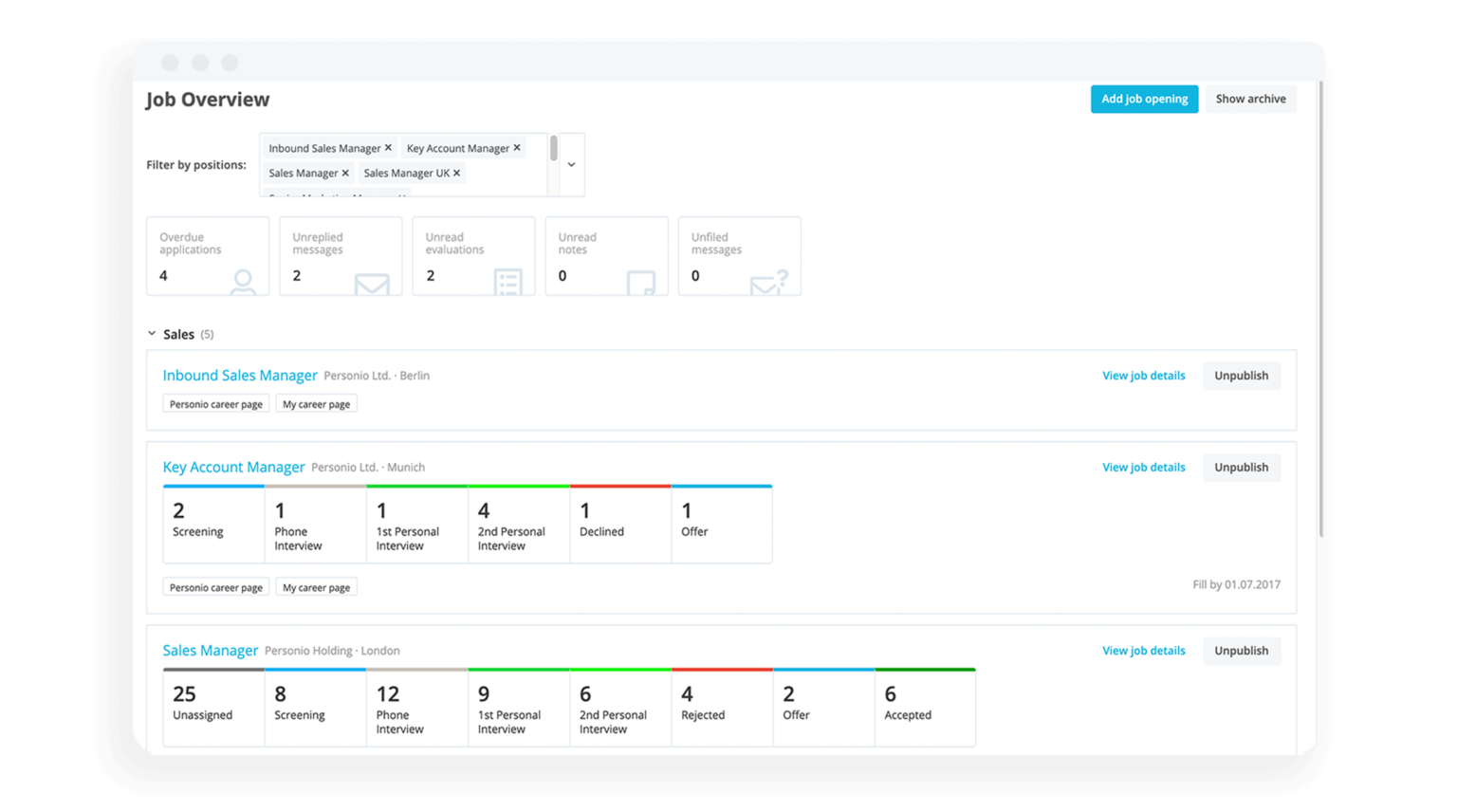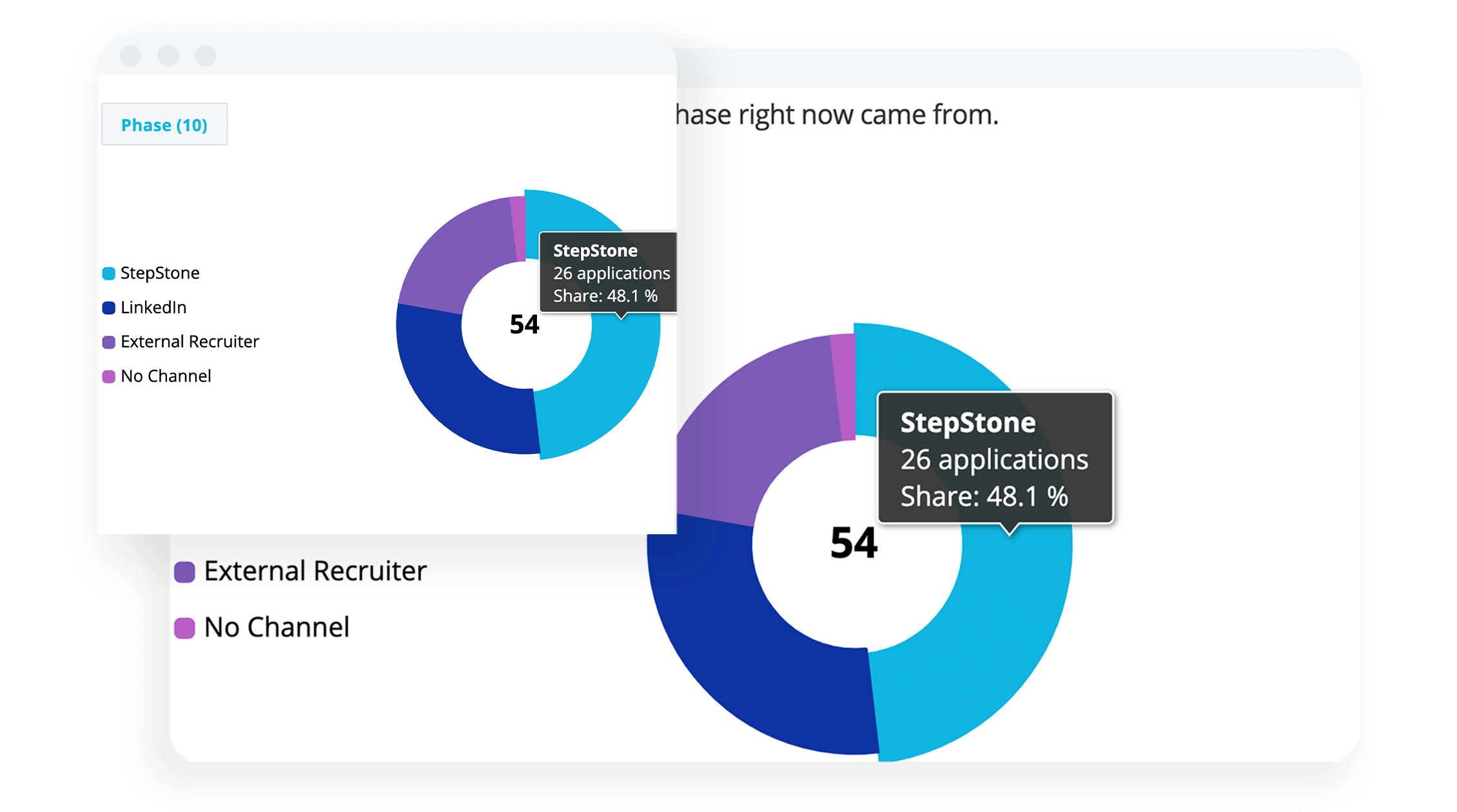
Evaluation Template
Evaluate your candidates consistently and easily.
Latest Blog Posts
Creating Competency-Based Interview Questions

There's no way around it: Competency-based interview questions can separate the good candidates from the great ones. But it only works if you put the preparation into making sure you have good questions.
Read on to discover more about competency-based interviews, how to use them effectively and discover 26 questions to ask candidates.
Track all your upcoming interviews from one place: Personio’s ATS.What is a Competency-Based Interview?
Designed to test more than one set of competencies, a competency-based interview is a way of asking questions of a candidate you’re thinking about hiring in a formal, structured way so you can get a comprehensive answer that provides deep insight.
Competency-based interviews are also known as behavioural, situational or structured interviews. They are designed to get candidates to provide real-life examples as the basis of their reply and are extremely common in many hiring processes.
How are Competency-Based Interviews Different to Normal Interviews?
Competency-based interviews are a specific type of structured interview. They tend to be more formal than normal or unstructured interviews. But, they are highly personal in that they allow for a varied response from the interviewee and provide far deeper insights.
Unlike in other interviews, which aim to get a feeling for a candidate more generally. In a competency-based interview, competencies are used as benchmarks that interviewers and recruiters use to rate and evaluate candidates.
How are Competency-Based Interview Questions Typically Phrased?
The idea behind competency-based interviews is to help the candidate picture themselves in a situation where they have demonstrated the skills you’re looking for, or imagine how they would address these if they haven’t done them in the past, and then talk about it.
You might ask questions using phrases like, ‘Give me an example of when…’, ‘Describe how you…’, ‘Tell me about a time when you…’, ‘What do you do when…’ or ‘Describe a time when…’.
In answering these questions you’re looking for a candidate to relate their response to your specific industry, the role they’ll be playing, the skill you’re looking for and a real-life situation.
Why Do They Matter for Recruiting Teams?
Competency-based interviews help interviewers and recruiters properly assess the candidate and prevent any potentially costly mis-hires. Asking the same questions makes it easy to compare lots of candidates and to compare answers against pre-determined criteria.
They can provide interviewers with valuable insights into how a person likes to work, their core competencies, their strengths and their weaknesses. They might even help predict their future behaviours.
It’s possible to use competency-based interview questions very cleverly, which is why candidates often find them hard to answer.
For example, while the question may appear simple – the way a candidate answers them (particularly if they don’t have an immediately relevant answer prepared) also provides clues about other things, including:
How they react under pressure
Their logical processes
Whether they jump ahead, unprepared, or consider a response in more detail
Their ability to cross-reference items, and create relevance, even when it might not be obvious.
While candidates can prepare for competency-based interviews, it’s always a good idea to throw something in that’s particularly relevant to your company, which it won’t have been possible for them to prepare. This shows you if they can think on their feet and may well reveal whether they will be a good cultural fit for your organisation.
Examples include:
If we gave you a budget of $500 to improve team morale here, think of an example of how you might use it.
Which of our company’s values resonates with you the most? Why?
While these are not, technically, competency-based questions, they fit the style and tone of the competency-based approach and allow you to test for a person’s attitude and values.
Create a great candidate experience

Organise applications, plan interviews and quickly evaluate candidates. Manage your entire hiring process with one tool with Personio.
Unlock Smoother HiringWhat Do Competency-Based Interview Questions Typically Assess?
The answer to this question lies in the name of the interview itself: competency-based. In most scenarios you can’t test whether an employee can do the job directly – so you have to answer questions to understand more about their attitudes, behaviours and, of course, competencies!
Typical competency-based interview questions look to see if someone has skills that are often hard to judge, even if they did perform well in other assessment tests (such as task-based tests or psychometric tests).
You might want to assess how adaptable they are, whether they understand how to resolve conflicts, how well they work in teams, whether they are resilient, organised, independent, decisive and flexible, and so on. You might also use competency-based interview questions to assess their level of commercial awareness, conflict resolution and problem-solving skills and even their leadership behaviours.
In short, if there’s a soft skill that’s critical for the role, getting a good answer to a competency-based interview question tells you a lot about the candidate.
26 Competency-Based Interview Questions to Ask Candidates
Subject | Question |
|---|---|
Team Leadership | Tell me about a time when you had to take on a leadership role unexpectedly. |
Management | How do you motivate your team to achieve their goals? |
Decision-Making | Tell me about an occasion when you had to make an important decision in the workplace. |
Conflict Resolution | Can you please give me an example of a workplace conflict situation you were involved in, and explain how you dealt with it. |
Seeing the Bigger Picture | Describe a time when you collaborated with people in other departments or contexts to deliver a positive outcome. |
Initiating Change | Tell me about your ability to initiate change and give an example of when this resulted in an improvement. |
Working Relationships | Please give me an example of the kind of working relationships that you most enjoy and why you enjoy them. |
Interpersonal Skills | Describe a situation where you got people to work together. |
Resilience | We’ve all had to deal with a lot, recently. Tell me about a time when you learned to be resilient, and how this has helped you. |
Creativity | Please tell me about an occasion when you had to think outside of the box. |
Flexibility | Please describe a situation where you had to change the way you approached a task. What did you do differently, and why? |
Attitude to Learning | Please share a situation where you made a mistake and learned from it. |
Teamwork | Describe a time when you positively contributed to your team. |
Communication | Please provide an example of how you’ve communicated bad or tough news to your colleagues or team. |
Trustworthiness | Please share a situation when you were able to demonstrate your trustworthiness. |
Persuasiveness | Talk me through a time when you used your communication skills effectively resulting in a successful outcome. |
Responsibility | Think of a scenario when you took responsibility. Please tell me about it. |
Planning and Organising | Describe a time when you used your organisational skills effectively to complete an important activity. |
Prioritisation | Think of a time when you had to consider conflicting workloads when planning a task or project. What did you do? |
Taking Initiative | Describe a situation when you were required to use your initiative to complete a complex task. |
Commercial Awareness | Please give me an example of a time you showed how you saved the company money or improved processes. |
Customer Focus | Can you recall a time when you adapted the way you did a task or helped a customer to get a better result? Tell me about it. |
Delivering Results | Please provide an example of a time when you did something exceptional. |
Technical Skills | What’s the best way in which you’ve been able to use your technical skills? Describe a scenario that explains this. |
Analytical Skills | How do you approach problems at work? |
Professional Development | Tell me about a time you were focused on your professional development, and what happened as a result. |
A Wider Pool of Talent to Identify

Attract more talent to your organisation with Personio. Click to find out how.
Sped-Up Sourcing With PersonioHow Do You Evaluate Candidate Responses?
Many recruiters advise candidates to prepare answers to competency-based interview questions using the STAR format. STAR stands for Situation, Task, Action, Results.
In an ideal world, candidates will be able to answer your questions by referring to something they have experienced in the past – and apply these learnings to the situation you’re asking about, explain the actions they’ve taken, and the results they achieved.
But remember, sometimes candidates haven’t had that experience. If so, they may need time to think of an example. It’s important not to pressure them, but it is okay to make suggestions, or even use a ‘for example’ of your own, to help them contextualise their thoughts.
One last thing to remember is that answering competency-based interview questions takes time! The type of question leads itself to longer answers, so don’t have a list of questions as long as your arm and expect candidates to be able to answer all of them! It just won’t be possible in the allocated time.
Improve the Quality & Experience of Your Hires Today
While an interview is one of the most important parts of the candidate experience, it’s part of a much bigger (and more arduous) process.
The good news is that while your HR team will always need to be involved in the recruitment process, it is possible to make the whole thing smoother.
To conclude a bit cheekily, if you were asking a competency-based question like, ‘Tell us how you improve processes…’ and your candidate said, ‘I use Personio!’ you would probably know, from their answer, that they’ve done their homework and realised that our applicant tracking software is an excellent way to get the job done.
Disclaimer
El contenido facilitado a través de nuestro sitio web (incluido el de carácter jurídico) solo pretende proporcionar información general no vinculante y no constituye en modo alguno un asesoramiento legal. La información presentada no sustituye ni pretende sustituir el asesoramiento legal de, por ejemplo, un abogado que aborde tu situación específica. A este respecto, queda excluida cualquier responsabilidad o garantía por la vigencia, la exactitud y la integridad de la información proporcionada.

